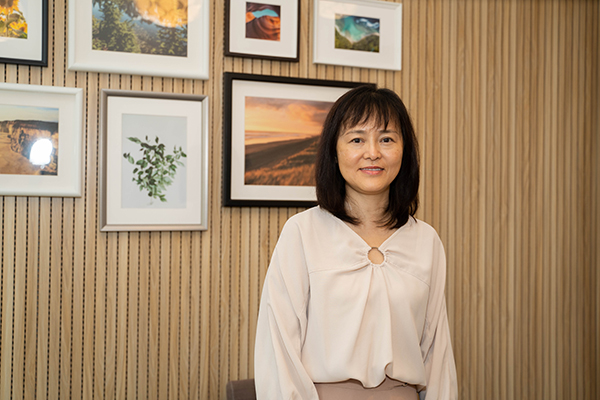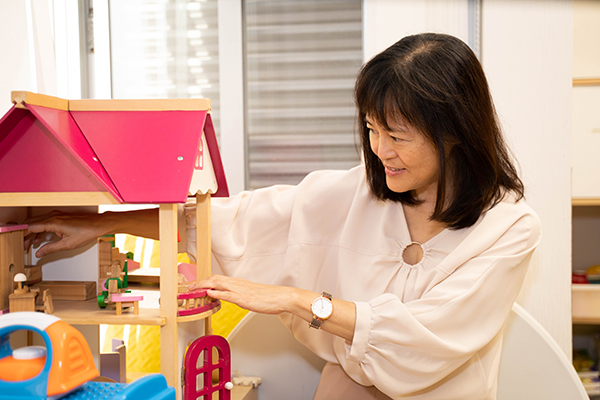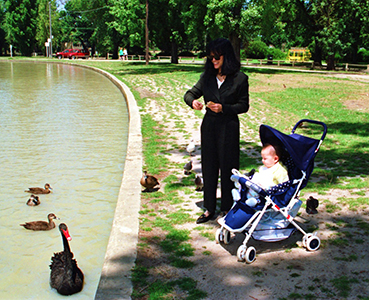Interview with Rachel Ng

How to reconcile familial relationships amidst separation?
In recent years, societal changes in Hong Kong, coupled with being trapped in lock down during the pandemic, created conflicts large and small in many families. Some choose to leave Hong Kong, who are then faced the trial of love under the impending separation. All these tribulations caused many underlying problems within families to surface, leaving people without relief. Rachel Ng, a Clinical Fellow of the American Association for Marriage and Family Therapy, has witnessed spouses and families carrying underlying worries and conflicts abroad, causing even larger impacts as they move to an unfamiliar place. "It feels like saving starfish, there is only so much I can save," she said with worry.
In recent years, Hong Kongers have been periodically discussing how to properly say farewell, but the crux of the problem is how to maintain the familial relationships in the first place. Rachel has gone through immigration in the 90s, her father passed during the pandemic, these all deepened her experiences with separation. In this interview, she shared her reflection on how to guard a family.
Embracing regrets in the process of healing
"In the past I didn't understand the feelings of my parents. Going through the helplessness in saying goodbye under the pandemic, I experienced the tortuousness of separation." Rachel sighed.
In March 2021, Rachel's father suffered from early-stage dementia. He had to stay in the hospital for three months because of delirium. Her father's situation worsened rapidly in the hospital. She saw her father having bruises and scratches on his limbs, imagined his father having physical altercations with the medical staff, and felt his father's anxiety and worry. "Later on, we thought that those days were hard on father, and the doctors permitted his release from the hospital." Her father was admitted into a nursing home after he got out from the hospital. Ten days later, his father had to return to the hospital because of pneumonia. The day that he was transported to the hospital, he was already in a coma. He passed shortly after.
As an experienced therapist, Rachel has had years of professional experiences coping with emotions. But she still couldn't escape from facing death and grief, "I allowed myself to stay in my feelings of regret." She wished to bring his father back to his place of origin, but her promise to her father remained unfulfilled, "I feel regretful that I did not leave enough time for my father."
She said that these feelings of regret and grief are essential parts of healing, "Embrace the parts that you think you have not done your best in. Feel it deeply, fully experience these emotions passing through you. These all help us mould our lives, and to know how to be better going forward."
Building a social network for parents before the move
"I witnessed a lot of people choosing to leave Hong Kong, and it brought all the memories and feelings back," Rachel said.
In the 90s, she and her husband immigrated to a foreign country not long after getting married, leaving her parents without a struggle. However, "after I became a therapist, I had a more thorough understanding of human connection. Moreover, I only understood the reluctance and anxiety of my parents after witnessing so many families undergoing conflicts and separation."

Rachel's family photo (Provided by the interviewee)
She thinks that if adult children decide to immigrate, they have to put more thought into the transition of their elderly parents, "The key is to help the parents build social circles." She reminded us that this is not something that could be done in the short term, but is a long-term, ongoing project. "Don't leave it until the last moment, this is the biggest point of reflection I got under the pandemic,” Rachel said. She said with a knowing smile that her thoughts were simplistic when she was younger. “My thoughts were my own personal business." Now, she thinks that there are a lot of different kinds of impacts the families immigrating face, including the mental health of the elders left behind, marital health, family education, and parent-child relationships.
Emotional conflicts causing tension in marriage
In recent years, Rachel has encountered a lot of spouses that came to seek help due to conflicts arised during the process of immigrating. For example, a husband was unable to let go of his family business, thinking that leaving equates to betraying his family lineage, but his wife hoping to have their children receive a western education. Rachel said that in the cases that she is in contact with, two-thirds are able to keep their minds open, with the intervention of the therapist, the communication between both sides can be smoother. However, one-thirds of the cases are emotional conflicts. "They would say, 'At the end of the day I have to go!' " said Rachel, "When they come to seek help, they only want the therapist to agree with their decision to immigrate, and to use that to convince the other party. They weren't willing to spend time with the therapist to solve problems."

"From my point of view, these immigrating families still have a lot of perspectives to review and strengthen." Rachel worried.
When Rachel immigrated with her husband, it was during an economic recession. She still remembers they always argued in the dark basement. "Anxiety is the monster in relationships." she said. Buying furniture is another "battlefield". Her husband was carefully managing their finances, but she wanted a higher quality lifestyle. "I only discovered then, we did not understand clearly each other's' goals in life."

source photo
"We only realised our immaturity when facing challenges." said Rachel. If both sides did not cultivate a stable communication, the new and foreign environment would cause a huge impact in communication. Rachel realised that spouses face challenges in all stages of life, and when they are not aware of these challenges, their relationships will easily fall into turmoil. "Therefore, when we are facing changes, we need to sit down and review the situation."
Immigration triggers emotional reactions from children
Rachel has had cases in children play therapy in the past that had to continue their treatment through video calls after immigration. There is one family where the spouses came to deal with their marital problems, which involved the special educational needs of the eldest son. However, they did not realise that their younger daughter was also in need of emotional support. When they moved to the new country, their "normal" daughter started suffering from psychosis. It turned out that the problems between the parents and the attention being put on the older brother caused a lot of piled up emotions in the daughter. To prevent adding to the parents' pressure, she didn't express her feelings and needs. In the end, she brought the emotional turmoil with her, coupled with the pressure of assimilating into the new school, her mental illness was triggered.
"A lot of problems stem from whether the most basic step was done well." What Rachel means is that in the ways of family education, "a lot of parents are not able to build a healthy parent-child communication." Parents should learn how to be caring when communicating with their children, such as saying "if you are upset, you can tell us!", when the child share their upsets, one can respond, "Oh, you must be feeling sad, someone one made you feel disrespected." Children need their parents to help co-regulate their emotions, in order to learn how to self-regulate, "you need to help your children learn how to express themselves in order for them to understand their own feelings." If this step is not done well, the consequences could be severe.

Rachel enjoyed parent-child time with her son in Australia. (Provided by the interviewee)
Rachel and her husband emigrated after their marriage and had a son. (Provided by the interviewee)
Rachel shared another spousal case she is dealing with, where the marriage was impacted by the husband's lack of ability to express his feelings. A detailed interview found that it is related to his experiences immigrating with his parents when he was in secondary school. "He only knew that they are immigrating a month before the fact, and he had no say in the issue," Rachel said. He didn't talk to his parents for a whole month after the immigration, because he wasn't able to accept this change, and found it difficult to enjoy his new life, "this caused him to be unhappy throughout his years in school when he was growing up." As his parents did not have a good communication with him, they only noticed their son's issues after immigrating, and found themselves at a loss. "I find it very unfortunate, that this problem has been piling up for a very long time, and ultimately affected his marriage," said Rachel.
Home is where the heart is. "The impact of the parents' relationship is the most important factor in whether the children are happy, much more so than how external environment affect their perspective in interpersonal relations," said Rachel. A lot of emotional and behavioural issues in the children stem from conflicts between their parents, and their inability in helping soothe their children. Therefore, Rachel said that in family therapy, the most important thing is to examine the family system. Or else, the problems will become intergenerational.








